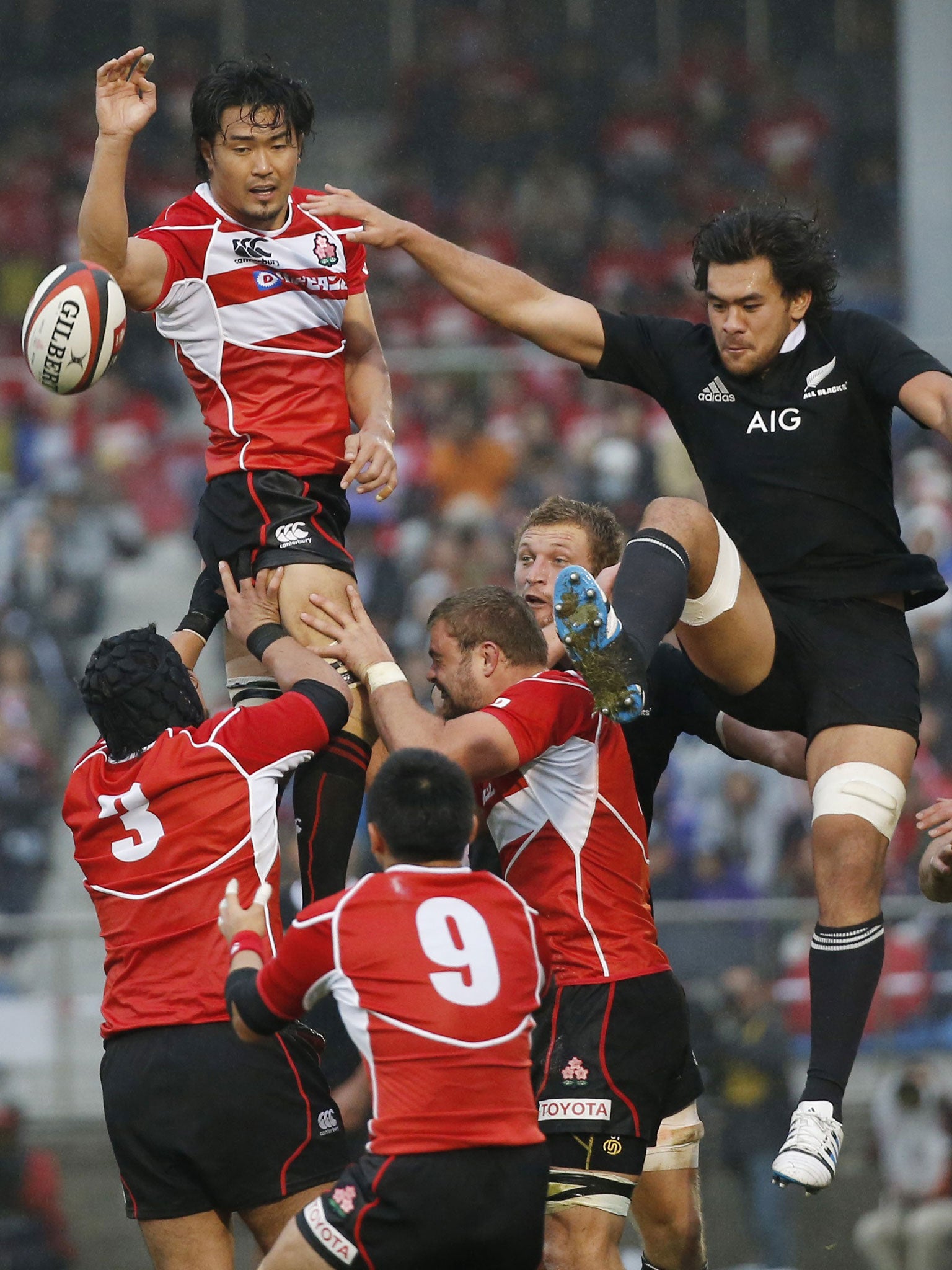Steve Borthwick relishing his role in Land of the Rising Scrum
Former England captain helping Japan improve as they look ahead to hosting the World Cup in 2019

In the mist shrouding Peffermill Playing Fields on the south-east side of Edinburgh, sandwiched in between a Honda garage and the Nairn oatcake factory, it was difficult to pick out the two sets of forwards packing down against each other on the far side of the main pitch. As the sun started to shine through, one of the coaches overseeing the morning toil became familiarly clear.
There was a time when Steve Borthwick had the red rose emblem firmly pressed against his left breast. "That feels like a long time ago," the former England captain remarked, three years on from the last of the 57 caps he collected over a nine year period. These days, when international windows release him from Saracens playing duty, the veteran lock can be found sporting the Cherry Blossom tracksuit badge.
While Stuart Lancaster, Chris Robshaw and co go about the business of preparing England for a home World Cup the year after next, Borthwick – as part-time lineout coach – is helping Japan lay the foundations for what will be a groundbreaking staging of the global extravaganza.
The 2019 Rugby World Cup will be the first time the tournament has been held outside one of the established top-tier nations. And, six years out, the signs are looking good. There is every indication that Japan has become the Land of the Rising Scrum.
True, the Brave Blossoms did wilt under a half century of All Black points in Tokyo last weekend (they lost 54-6) but then Scotland shipped 51 points against the reigning world champions at Murrayfield 12 months ago and Ireland were humped 60-0 in Hamilton last year. Against the more mortal members of the international scene, Japan are not the pushovers they once were.
The last time they played Scotland, at McDiarmid Park in Perth back in 2004, they were thrashed by a full century, 100-8. Nine years on, as they prepare to open their 2013 European tour against the Scots at Murrayfield tomorrow, they are seeking to build on the platform of a momentous 23-8 victory against Wales in Tokyo in June. Admittedly, the reigning European champions were without their Lions players that day but they still had the likes of Dan Biggar and Bradley Davies in their ranks –and Lou Reed, the Cardiff Blues lock.
It was a day of perfection for Eddie Jones, the man who has masterminded the rise of the Japanese national team in his two years as head coach. Thankfully, the wily Aussie, who guided the Wallabies to a home World Cup final in 2003, is recovering from the mild stroke that he suffered a month ago. He has handed over head coach duties to Scott Wisemantel for the duration of the European tour – which continues against Gloucester at Kingsholm next Tuesday, Russia in neutral Colwyn Bay three days later and Spain in Madrid on 23 September – but intends to pick up the reins thereafter.
"I think what Eddie is building with this team is really exciting for Japan's future," said Borthwick, sporting nasal stitches from his part in the 40-3 home win that kept Sarries top of the Aviva Premiership pile last Sunday. "He signed me for Saracens from Bath in 2007 and he's the reason why I'm helping out. He's a phenomenal coach. The opportunity to learn under him on the coaching side was something I jumped at.
"I was involved in the summer, during the period of the win against Wales, and that result was a sign of how the team is developing. I see people who are incredibly passionate about rugby and who work very, very hard. There are a lot of talented guys in this group too."
That much has become clear over the course of Jones' tenure – which has also yielded wins against Georgia, Romania, Canada and the USA and a clean sweep of this year's Asian Five Nations' Championship. Jones' mother hails from the Land of the Rising Sun and, upon his appointment, he dispensed with the policy of naturalising overseas-born players that hallmarked John Kirwan's reign (only a handful remain) in favour of developing home grown talent with dynamic native Japanese qualities.
Scrum-half Fumiaki Tanaka has become the first Japanese player to play Super Rugby, vying for the No 9 shirt at the Highlanders with All Black Aaron Smith. Hooker Shota Horie has followed in his footsteps, cementing the No 2 jersey at the Melbourne Rebels.
The profile of the sport in Japan is steadily rising ahead of the 2019 World Cup. The country has 48,470 senior male players, compared to 13,873 in Scotland. The popularity of the university and the industry-backed club game is third only to baseball and football. Tickets for last weekend's All Blacks game sold out in less than an hour.
With another Sarries old boy, former scrum-half-cum-full back Kensuke Iwabuchi, as general manager, the Japanese Rugby Football Union is using the home World Cup to develop the game beyond its borders. Backed by the Japanese government, the JRFU has launched a 'Scrum' project to popularise the game throughout the Asian continent.
"It is not just about our nation," said Tatsuzo Yabe, chairman of the JRFU. "It will be a World Cup for the whole of Asia. We have a huge responsibility to contribute to the growth of rugby in Asia. It's out aim to leave a lasting legacy long after the tournament has finished."
Subscribe to Independent Premium to bookmark this article
Want to bookmark your favourite articles and stories to read or reference later? Start your Independent Premium subscription today.

Join our commenting forum
Join thought-provoking conversations, follow other Independent readers and see their replies